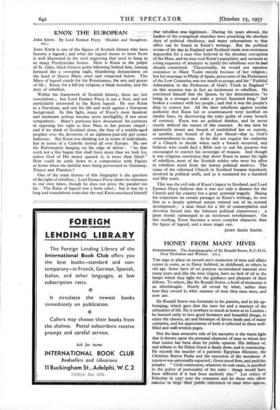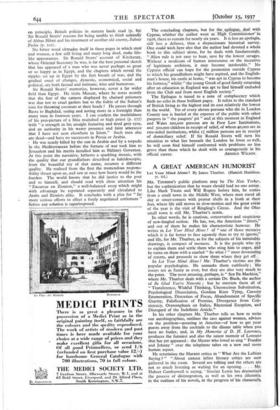HONEY FROM MANY HIVES
Orientations. The Autobiography of Sir Ronald Storrs, K.C.M.G. (Ivor Nicholson and Watson. 2Is.)
THE urge to place on record one's memories of men and affairs comes to some, as to Daisy Ashford, in childhood, to others in old age. Some have of set purpose accumulated material over many years and, like the wise virgins, have no lack of oil in the lamps which they light for the guidance and pleasure of their fellows. To others, like Sir Ronald Storrs, a book of memories is an afterthought. Nearly all reveal by what, rather than how they record it, what manner of men they once were, and now are.
Sir Ronald Storrs was fortunate in his parents, and in his up- bringing, which gave .him the taste for and a mastery of the urbanities of life. He is nowhere so much at home as in London ; he learned early to love good literature and beautiful things, to enjoy the classics, art and literature of divers lands and of many centuries, and his appreciation of both is reflected in these well- filled and well-written pages.
Not the least attractive side of his narrative is the Warm light that it throws upon the personal character of men to whom less than justice has been done by public opinion. His defence of, and tribute to Sir Eldon Gorst is finely done, and is convincing. He records the murder of a patriotic Egyptian Minister, the Christian Butros Pasha and the execution of the murderer. A reprieve was universally expected; Gorst stood firm, and paid the penalty. "Civil commotion, whatever its real cause, is ascribed to the policy of personality of the ruler : things would have been different if it had been anybody else." Let critics of Palestine in 1937 note the comment and let those who allow rabcOur'to tinge ttitii publict eference'S to Men v'ho l oppose, on principle, British policies in eastern lands read (p. 89) "Sit Ronald Storrs' reasons for being unable to think miltindlY of Abbas Hilmi and his treatment of another old enemy, Zubair Pasha (p. Jot).
No bitter word obtrudes itself in these pages in which men' and women, a few still living and many long dead, make life- like appearances. Sir Ronald Storrs' account of Kitchener, whose Oriental Secretary he was, is far the best personal sketch that has appeared of a man who was never perhaps so great or so happy as in Egypt, and the chapters which reveal the ripples set up in Egypt by the first breath of war, and the gradual onset of changes, dynastic,. economical, social and political, are both factual and intimate, wise and humorous. Sir Ronald Storrs' memories, however, cover a far wider field than Egypt. He visits Muscat, where he notes acutely that the fear of the camera displayed by chained prisoners was due not to cruel gaolers but to the foible of the Sultan's sons for throwing coconuts at their heads ! He passes through Basra to Baghdad, seeing and noting more in a fortnight than many men in fourteen years. I can confirm the truthfulness • of his pen-picture of a Shia mujtahed or high priest (p. 272) -with "a strength in his straight featuring and tired grey eyes, and an authority in his weary presence and faint utterance that I have not seen elsewhere in Islam." Such men alas are dead—and have no successors in Persia or Arabia.
^ He was nearly killed by the sun in Arabia and by a torpedo in the Mediterranean before the fortune of war took him to Jerusalem and his merits installed him as Military Governor. At this point the narrative, hitherto a sparkling mosaic, with the quality that our grandfathers described as kaleidoscopic, from the beautiful toy of that name, assumes a different quality. He realised from the first the tremendous respons- ibility thrust upon us, and saw at once how heavy would be the burden. The world knows that he did justice to the post and to himself, and should read with close attention his ".." Excursus on Zionism," a well-balanced essay which might with advantage be reprinted separately and circulated to Arabs and Zionists alike. It concludes with a plea for "far • more serious efforts to effect a freely negotiated settlement" be.'" fore any solution is superimposed. The concluding chapters, but for the epilogue, ,tleal with Cyprus, whither- the author went as Hig*h Commissioner-1n 1926, there to remain for nearly six years. It is less an apologia, still less a defence, than a dispassionate historical survey. One could wish here also that the author had devoted a whole book to this subject alone, for he deals with fundamentals. " Alien rule is not easy to bear, save by the lowest savages. ,Without a modicum of human intercourse or the incentive of legitimate ambition, it may become intolerable." No Cypriot official can hope for the promotion outside Cyprus to which his grandfathers might have aspired, and the English- man's house, his castle at home, "was apt in Cyprus to become his fortress," whilst" the young Greek of good family returning after an education in England was apt to find himself exduded from the Club and from most English society."
The Epilogue is tuned to a note of complacency which finds no echo in these brilliant pages. It refers to the standard of British living as the highest and its cost relatively the lowest in the world. Yet of every eleven persons who die in London County one is buried at the expense of the public with other paupers in "the paupers' pit" and at this moment in England and Wales 200,000 persons are in Poor Law • Institutions, and soo,000 children in receipt of relief, of whom 40,003 are in rate-aided institutions, whilst z million persons are in receipt of domiciliary relief. If Sir Ronald Storrs will turn his attention to what lies beneath the London he loves so well, he will soon find himself confronted with problems no less grave than those which he dealt with so courageously in his























































 Previous page
Previous page